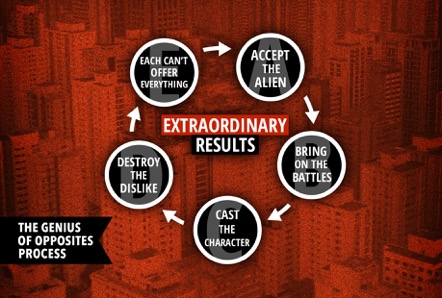How Introverts and Extroverts Achieve Extraordinary Results Together
- “I don’t understand extroverts. She is so out there.”
- “I don’t know what he is thinking. What is bothering him?”
- “How do I break through to her?”
- “Was that a conclusion or is he thinking out loud?”
As an extrovert married to an introvert, I have long been interested in what makes an effective partnership between very different people. I’ve learned that I’m far from alone and that many successful duos are two people with different styles and approaches. Whether a married couple or a business partnership, it is possible to adapt and develop a winning partnership. Learning to leverage each other’s strengths and capitalize on your differences can improve your results.
Author and speaker Jennifer B. Kahnweiler, PhD is known as the “champion for introverts.” I recently talked with her about her research and her new book, The Genius of Opposites: How Introverts and Extroverts Achieve Extraordinary Results Together. She has developed a system designed to help opposites stop emphasizing the differences and instead drive toward results.
Famous Opposites
Would you share a few examples of famous opposites?
Sure, there are many. The Wright Brothers, Venus and Serena Williams, Mick Jagger and Keith Richards, Mark Zuckerberg and Sheryl Sandberg, Penn and Teller, Siskel and Ebert, Teddy Roosevelt and William Howard Taft, Steve Jobs and Steve Wozniak.
Sticking Points
What most bothers introverts about extroverts and vice versa?
There are a lot of disconnects on both sides. Introverts think extroverts are changing their minds and don’t have clear thinking when they toss out ideas. But they are just releasing their energy, and they get charged up that way. They are just downloading ideas.
Introverts also wonder why extroverts need so much going on. They think extroverts don’t have enough self-discipline to just be there and get work done. Introverts judge that a lot. But extroverts like more stimulation, and the juggling makes them energized and engaged. They get their work done, just in spurts.
Other misfirings in their wiring? Being private (introverts) vs. being an open book (extroverts) causes challenges. Introverts want to get to know you slowly and warm up to you. Extroverts feel excluded when introverts don’t share and get tired of pulling answers out of introverts who don’t offer much info during conversations.
Introverts crave quiet time for recharging, creativity and decompression and are frustrated when extroverts don’t let them have it. Like a teenage boy, my introverted husband Bill keeps a sign on the door that says, “Do Not Disturb.” He means it, too!
A Model for Bringing Us Together
Opposites can form a strong partnership if they follow your ABCDE model. How did you develop this approach? Is one part more difficult for an extrovert or introvert?
I interviewed over 40 sets of opposite partners and key themes emerged. I asked them to explore the successes and struggles they had in working with their opposite partner. Because they spoke with me or wrote me separately, some unique perspectives emerged. I also read about figures from sports, entertainment and science. I learned that the success factors crossed over fields and roles.
I think the challenges we face in opposite pairings are equally difficult for introverts and extroverts. And if we are honest about it, we each drive each other crazy from time to time!
How Opposites React to Stress
How do opposites react to major stress?
Introverts retreat and get quiet. Extroverts are frustrated trying to get the introverts to share what is bothering them. Extroverts get charged up and talk more than normally. Introverts are not sure how to handle the increased verbal expression and are equally as frustrated.
Bring on the Battles
Bringing on battles is one component for success. How do you coach people through this if they are conflict avoidant?
It helps to reframe conflict as normal, natural and necessary. Think about a conflict you had in the past that led to a great solution or brought you closer to an opposite.
First consider what your goal is and make an effort to understand what your opposite wants. Allow the introverted partner to write down their ideas and give permission for the extrovert to talk things out. Take time outs and consider bringing in a third party to break through impasses.
As you work through conflicts you will see the benefits and be less afraid of addressing small disagreements in your partnership that can turn into huge arguments.
Those partners who meet weekly and openly communicate with each other catch small conflicts before they explode into complex disagreements.
Another suggestion: There will always be those things about our opposites that drive us crazy. Sometimes the best thing we can do is to is press the restart button and take a break from that person so we can come back ready to openly communicate.
Feedback Served Your Way
What different approaches do you recommend for giving and receiving feedback?
When you give feedback ask if it is a good time, be clear and specific, ask open-ended questions such as “How do you see it?” and be specific about what you want to see happen the next time the situation occurs. Be sure to say thank you.
When you receive feedback, ask whether now is a good time to get it and ask for examples. Paraphrase to be sure you understand, acknowledge the feedback, consider it and don’t forget to say thank you.
And do remember that feedback is a gift, and some gifts can be returned! In other words, you don’t have to accept or do something with ALL of it.
Clear this up for us once and for all. Do opposites attract? Is it more or less likely for a relationship to survive and thrive?
Yes, they do but it takes work to maintain this delicate balance. If they stop emphasizing their differences and use approaches that move them both towards results, they will greatly increase the chances of success.
Creating Sustainable Success
Often we read a book, go to a seminar, and start putting things into action. It makes a difference for a while until we slip. What’s the best method for sustainable success?
 Keep The Genius of Opposites on your night stand and sleep on a question from the back of chapters 3-7 each night. I actually had a client who did that with my book Quiet Influence, and she said it made a difference to break up the skills she wanted to focus on in this way. The next day she would put her attention on a strength she was trying to improve. That worked for her. Own your own strengths and use them with your opposite to get things done.
Keep The Genius of Opposites on your night stand and sleep on a question from the back of chapters 3-7 each night. I actually had a client who did that with my book Quiet Influence, and she said it made a difference to break up the skills she wanted to focus on in this way. The next day she would put her attention on a strength she was trying to improve. That worked for her. Own your own strengths and use them with your opposite to get things done.
I am all about action. Commit to a step that you think will give you payoff in the situation you are in right now. An example? Take the free Genius of Opposites quiz and decide what actions you can take. Then ask one of your work opposites to take the quiz and compare your results. Decide what makes sense to add to your communication process so that you can work towards extraordinary results. It may be a simple step as in “Casting the Character” of stepping out of your role occasionally. Or perhaps you decide to do a better job of synching up your client presentation before the meeting in “Each Can’t Offer Everything.”
The Genius of Opposites: How Introverts and Extroverts Achieve Extraordinary Results Together



